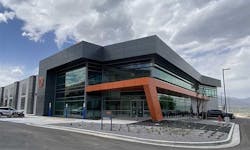DataBank Deal Expands Funding Options for Colocation, Edge Computing
A recent financing by DataBank breaks new ground in funding data center growth, and may help colocation and edge computing companies raise money using strategies previously limited to huge hyperscale deals.
DataBank raised $658 million through the sale of secured notes, a strategy that allows companies to borrow funds at a lower rate using pools of assets and cash flow as collateral. Previous secured notes have been backed by wholesale data centers with long-term leases and marquee tech companies as tenants. The DataBank deal expands this strategy to multi-tenant data centers with enterprise tenants, who typically are governed by service agreements with shorter terms.
For tech enthusiasts, real estate securitization may not feel like an exciting bright shiny thing. Here’s why this matters: It makes it easier for colocation and edge computing providers to use low-cost capital to build more data centers. And that’s an exciting prospect in the capital-intensive data center business.
The DataBank secured notes provide cash for construction or acquisitions, while reducing the company’s borrowing costs by $17 million a year.
“For DataBank, and the industry, this represents a significant milestone,” said Kevin Ooley, President and CFO of DataBank. “As the first ever securitization of a multi-tenant, enterprise-focused data center, it favorably compares DataBank’s model to that of hyperscale data center operators who have been the only operators to previously conduct this kind securitization.”
Pioneers in Secured Note Funding
DataBank is a colocation provider operating in both primary and secondary data center markets. It is owned by Colony Capital, a real estate firm with a vision for converged digital infrastructure, bringing together hyperscale, colocation, modular data centers, small cell networks and fiber to create a converged digital infrastructure.
Colony CEO Marc Ganzi has been a pioneer in using securitization to raise affordable capital for data infrastructure, first in the telecom tower sector and more recently in small cells and data centers. In securitization financing, a company creates a security based on the creditworthiness of a specific pool of assets, rather than the entire company. Data center developers can issue debt backed by cash flow from operational data centers, and the tenant credit quality enables the issuer to pay lower interest rates, which reduces the cost to build additional facilities.
Lenders like low risk, and in real estate, the coziest scenario is long-term leases with credit tenants that are not going to default. The first use of secured notes in the data center industry featured Vantage Data Centers, a wholesale provider owned by Colony whose clients included the world’s largest and most credit-worthy companies. Vantage has now done a series of secured note deals while raising $3.6 billion in funding, equipping the company to make three acquisitions in 2020 and boost its IT capacity by 90 percent.
Others have followed Vantage’s lead, most notably STACK Infrastructure, which has raised $1.8 billion in a series of securitized transactions.
Investors’ appetite for data center opportunities clearly extends beyond the wholesale sector, as Digital Colony sought investors for the DataBank secured notes. The offer was “significantly oversubscribed,” with more than 50 investors participating in the funding.
“The strong reception we received on this financing from ABS (asset-backed security) investors reflects the mission critical nature of DataBank’s edge infrastructure,” said Tom Yanagi, Managing Director of Digital Colony, who said the funding “drives substantial shareholder value to DataBank shareholders, as we also facilitate the growth of customer edge workloads.”
More Options for Colo, Edge Providers
DataBank’s fundraising highlights the emergence of the business edge, as stakeholders in distributed computing step up their investment and deploy real-world edge infrastructure. This trend has gained momentum in recent months, as growing customer interest validates business models and partnerships.
DataBank has ambitions to be a serious player in edge computing, which brings data and services as close to the end user as possible. Last year it acquired zColo, the colocation business of Zayo Group Holdings, expanding DataBank’s platform to 65 data centers in 29 metro markets and 20 major interconnect locations. The company also has made an investment in edge data center specialist EdgePresence.
The deals reflect DataBank’s role as Colony Capital’s platform for a series of acquisitions to implement a “digital playbook” for converged infrastructure.
The DataBank funding also arrives amid a busy season for data center M&A activity, including the entrance of data center SPACs (special purpose acquisition corporations) looking to acquire private companies in the sector. Between SPACs, infrastructure investors and secured notes, multi-tenant data center operators have a growing set of options for funding growth.
About the Author



